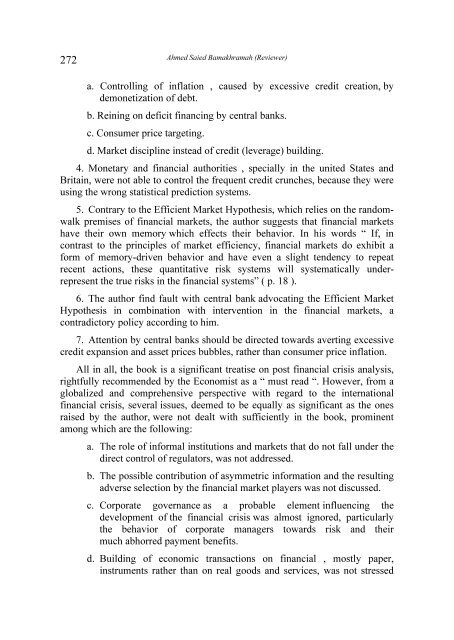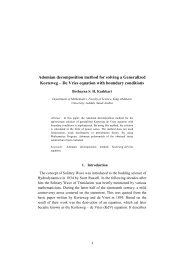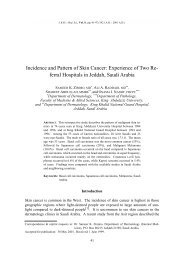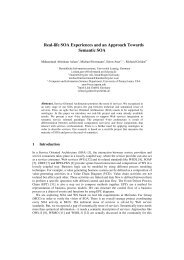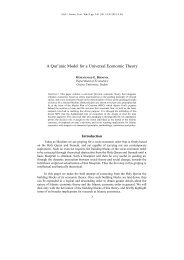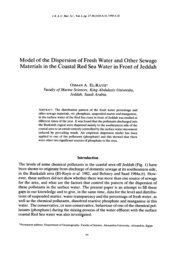The Origin of Financial Crisis: Central Banks, Credit Bubbles and the ...
The Origin of Financial Crisis: Central Banks, Credit Bubbles and the ...
The Origin of Financial Crisis: Central Banks, Credit Bubbles and the ...
Create successful ePaper yourself
Turn your PDF publications into a flip-book with our unique Google optimized e-Paper software.
272<br />
Ahmed Saied Bamakhramah (Reviewer)<br />
a. Controlling <strong>of</strong> inflation , caused by excessive credit creation, by<br />
demonetization <strong>of</strong> debt.<br />
b. Reining on deficit financing by central banks.<br />
c. Consumer price targeting.<br />
d. Market discipline instead <strong>of</strong> credit (leverage) building.<br />
4. Monetary <strong>and</strong> financial authorities , specially in <strong>the</strong> united States <strong>and</strong><br />
Britain, were not able to control <strong>the</strong> frequent credit crunches, because <strong>the</strong>y were<br />
using <strong>the</strong> wrong statistical prediction systems.<br />
5. Contrary to <strong>the</strong> Efficient Market Hypo<strong>the</strong>sis, which relies on <strong>the</strong> r<strong>and</strong>omwalk<br />
premises <strong>of</strong> financial markets, <strong>the</strong> author suggests that financial markets<br />
have <strong>the</strong>ir own memory which effects <strong>the</strong>ir behavior. In his words “ If, in<br />
contrast to <strong>the</strong> principles <strong>of</strong> market efficiency, financial markets do exhibit a<br />
form <strong>of</strong> memory-driven behavior <strong>and</strong> have even a slight tendency to repeat<br />
recent actions, <strong>the</strong>se quantitative risk systems will systematically underrepresent<br />
<strong>the</strong> true risks in <strong>the</strong> financial systems” ( p. 18 ).<br />
6. <strong>The</strong> author find fault with central bank advocating <strong>the</strong> Efficient Market<br />
Hypo<strong>the</strong>sis in combination with intervention in <strong>the</strong> financial markets, a<br />
contradictory policy according to him.<br />
7. Attention by central banks should be directed towards averting excessive<br />
credit expansion <strong>and</strong> asset prices bubbles, ra<strong>the</strong>r than consumer price inflation.<br />
All in all, <strong>the</strong> book is a significant treatise on post financial crisis analysis,<br />
rightfully recommended by <strong>the</strong> Economist as a “ must read “. However, from a<br />
globalized <strong>and</strong> comprehensive perspective with regard to <strong>the</strong> international<br />
financial crisis, several issues, deemed to be equally as significant as <strong>the</strong> ones<br />
raised by <strong>the</strong> author, were not dealt with sufficiently in <strong>the</strong> book, prominent<br />
among which are <strong>the</strong> following:<br />
a. <strong>The</strong> role <strong>of</strong> informal institutions <strong>and</strong> markets that do not fall under <strong>the</strong><br />
direct control <strong>of</strong> regulators, was not addressed.<br />
b. <strong>The</strong> possible contribution <strong>of</strong> asymmetric information <strong>and</strong> <strong>the</strong> resulting<br />
adverse selection by <strong>the</strong> financial market players was not discussed.<br />
c. Corporate governance as a probable element influencing <strong>the</strong><br />
development <strong>of</strong> <strong>the</strong> financial crisis was almost ignored, particularly<br />
<strong>the</strong> behavior <strong>of</strong> corporate managers towards risk <strong>and</strong> <strong>the</strong>ir<br />
much abhorred payment benefits.<br />
d. Building <strong>of</strong> economic transactions on financial , mostly paper,<br />
instruments ra<strong>the</strong>r than on real goods <strong>and</strong> services, was not stressed


